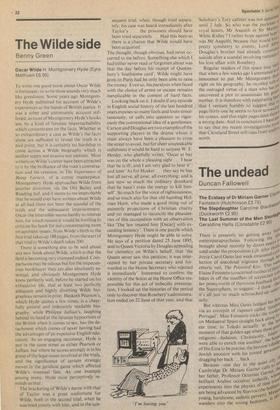The Wilde side
Benny Green
Oscar Wilde H. Montgomery Hyde (Eyre Methuen £6.95)
To write one good book about Oscar Wilde is fortunate; to write three sounds very much like greediness. Some years ago Montgomery Hyde published his account of Wilde's experiences at the hands of British justice. It was a sober and unromantic account stiffened, as most of Montgomery Hyde's books are, by a kind of forensic imperturbability which concentrates on the facts. Whether in so extraordinary a case as Wilde's the facts alone are sufficient to 'reveal the truth is a nice point, but it is certainly no hardship to come across a Wilde biography which is neither soppy nor evasive nor pietistic. Most writers on Wilde's career have been attracted to it by the brilliance of the man's conversation and his creation, in The Importance of Being Earnest, of a comic masterpiece. Montgomery Hyde approaches Wilde from another direction, via the Old Bailey and Reading Jail, and it seems to me improbable that he would ever have written about Wilde at all had there not been the scandal of the trials and the subsequent imprisonment. Oscar the litterateur seems hardly to interest him, for which reason it would be footling to criticise his book for not concentrating more on aesthetic issues; from Wilde's birth to the first trial takes up 188 pages, from the start of that trial to Wilde's death takes 200.
There is something else to be said about any new book about Wilde, which is that the field is becoming very cramped indeed. Comparisons may be odious but for the impecunious bookbuyer they are also absolutely essential, and obviously Montgomery Hyde knew perfectly well, before he started on his exhaustive life, that at least two perfectly adequate and highly diverting Wilde bio graphies remain in print. Hesketh Pearson's, which Hyde quotes a few times, is a cheer fully amoral and indecently readable biography, while Philippe Jullian's, laughing behind its hand'at the fatuous hypocrisies of the British when it comes to sex, has the detachment which comes of never having had the advantages of an expensive English edu cation. As an engaging raconteur, Hyde is not in the same street as either Pearson or Jullian, but where he scores strongly is in his grasp of the legal issues involved at the trials, and the significance of certain strategic moves in the juridical game which affected Wilde's eventual fate. As one example among many, Hyde most perceptiveJy 'reminds us that : The bracketing of Wilde's name with that of Taylor was a great misfortune for Wilde, both in the second trial, when he was tried jointly with him, and in the sub


































 Previous page
Previous page